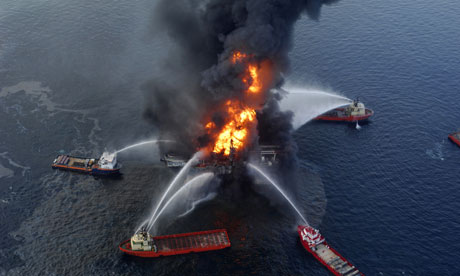|

by Daniel Tencer
May 29, 2010
from
RawStory Website

BP 'totally in charge
of the news' about oil leak,
energy expert says
As the latest effort to plug the oil
leak in the Gulf of Mexico meets with failure, the idea of nuking
the immediate area to seal the oil underground is gaining steam
among some energy experts and researchers.
One prominent energy expert known for predicting the oil price spike
of 2008 says sending a small nuclear bomb down the leaking well is
"probably the only thing we can do" to stop the leak.
Matt Simmons, founder of energy investment bank Simmons &
Company, also says that there is evidence of a second oil leak about
five to seven miles from the initial leak that BP has focused on
fixing. That second leak, he says, is so large that the initial one
is "minor" in comparison.
Simmons spoke to Bloomberg News on Friday, before BP announced that
its latest effort to plug the leak, known as the "top kill" method,
had failed.
"A week ago Sunday the first
research vessel... was commissioned by NOAA to scour the area,"
he said.
They found "a gigantic plume" growing
about five to seven miles from the site of the original leak,
Simmons said.
Simmons said the US government should immediately take the effort to
plug the leak out of the hands of BP and put the military in charge.
"Probably the only thing we can do
is create a weapons system and send it down 18,000 feet and
detonate it, hopefully encasing the oil," he said.
His idea echoes that of a Russian
newspaper that earlier this month suggested the US detonate a small
nuclear bomb to seal the oil beneath the sea.
Komsomoloskaya Pravda argued in
an editorial that Russia had successfully used nuclear weapons to
seal oil spills on five occasions in the past.
Live Science reports:
Weapons labs in the former Soviet
Union developed special nukes for use to help pinch off the gas
wells. They believed that the force from a nuclear explosion
could squeeze shut any hole within 82 to 164 feet (25 to 50
meters), depending on the explosion's power. That required
drilling holes to place the nuclear device close to the target
wells.
A first test in the fall of 1966 proved
successful in sealing up an underground gas well in southern
Uzbekistan, and so the Russians used nukes four more times for
capping runaway wells.
Simmons also told Bloomberg that the idea to use radical measures
like a nuclear bomb to seal the leak is probably not being
contemplated by decision-makers,
"because BP is still totally in
charge of the news and they have everyone focused on the top
kill."
Asked by a Bloomberg reporter about the
risks involved in setting off a nuclear bomb off the coast of
Louisiana, Simmons argued that a nuclear explosion deep inside a
well bore would have little effect on surrounding areas.
"If you're 18,000 feet under the sea
bed, it basically wont do anything [on the surface]," he said.
Joe Wiesenthal
at Business
Insider says the idea of using nukes will be getting a lot of
attention now that the "top kill" procedure has failed.
Next, the so-called "nuclear option" is about to get a lot of
attention. In this case, of course, nuclear option is not a
euphemism. It's the real idea that the best way to kill this thing
is to stick a small nuke in there and bury the well under rubble...
By the middle of the coming week, it will be all over cable
news, as pundits press The White House hard on whether it's being
considered and why not.
The following video was broadcast on Bloomberg News, Friday May 28,
2010:
|

